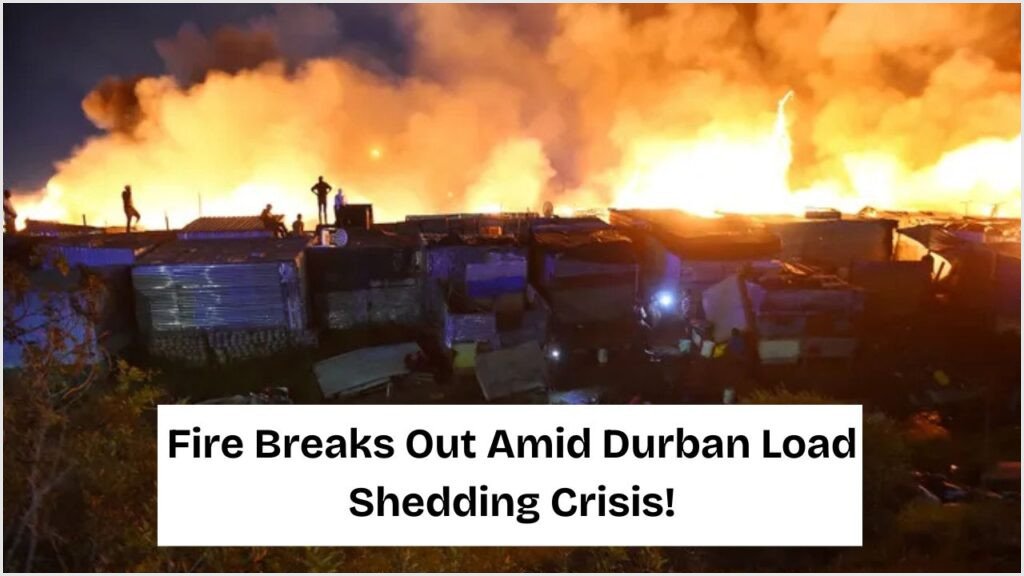Durban Supermarket Blaze Sparks Investigation During Load Shedding Chaos: The recent fire outbreak at a Durban supermarket has caught the attention of both local authorities and residents, as the incident occurred amidst the ongoing load shedding crisis that has left many South Africans frustrated and concerned. The blaze, which engulfed a significant portion of the store, has prompted urgent investigations to ascertain the cause and potential connections to the erratic power supply interruptions plaguing the country. As South Africans grapple with frequent blackouts, the incident highlights the precarious situation businesses and homeowners face, raising questions about safety preparedness and the broader implications of load shedding on daily life.
Implications of Load Shedding on Durban Businesses
Load shedding has become a formidable challenge for businesses in Durban and across South Africa. The unpredictable power cuts, often occurring at peak business hours, disrupt operations and can lead to significant financial losses. Many businesses, including supermarkets, rely heavily on electricity for refrigeration and other essential services. When the power goes out unexpectedly, it not only affects the supply chain but also poses a risk of spoilage and waste, which can incur substantial costs.
- Operational disruptions: Businesses need to halt services during power cuts, affecting productivity.
- Financial impact: Loss of revenue due to downtime and potential spoilage of goods.
- Increased costs: Investment in backup power solutions like generators adds to operational expenses.
- Safety concerns: Power cuts increase the risk of accidents and security vulnerabilities.
Investigating the Durban Supermarket Fire
The investigation into the Durban supermarket blaze is currently underway, with authorities looking into various potential causes. Load shedding has been identified as a possible factor, considering the timing and circumstances surrounding the fire. Investigators are examining whether the power cut could have led to a malfunction or an oversight that ignited the flames. They are also assessing the store’s compliance with safety regulations and the adequacy of its emergency response protocols.
| Date | Event | Details |
|---|---|---|
| October 2023 | Fire Outbreak | Supermarket in Durban catches fire |
| October 2023 | Investigation Launch | Authorities begin probing the cause |
| October 2023 | Load Shedding | Ongoing power cuts in the area |
| October 2023 | Community Impact | Local businesses and residents affected |
Community Response to Load Shedding and Safety Concerns
The Durban community has expressed a mix of frustration and determination in response to the ongoing load shedding and the recent supermarket fire. Many residents and business owners are calling for better infrastructure and solutions from the government to mitigate the adverse effects of power cuts. Safety has become a paramount concern, with calls for stricter enforcement of fire safety regulations and improved emergency preparedness among businesses and residential areas.
- Community meetings: Residents are organizing to discuss safety measures and share resources.
- Petitions for change: Locals are pushing for government intervention and investment in reliable energy solutions.
- Collaboration with authorities: Community leaders are working with officials to enhance safety protocols.
Strategies for Businesses to Cope with Power Interruptions
Businesses in Durban are adopting various strategies to cope with the challenges posed by load shedding. From investing in alternative energy sources to enhancing safety protocols, these measures aim to minimize disruptions and ensure continuity of operations. Businesses are also focusing on employee training to handle emergencies effectively and maintain safety standards during power outages.
- Investing in solar power: Many businesses are turning to solar energy as a more sustainable and reliable power source.
- Enhancing safety training: Regular drills and training sessions for staff on emergency response and safety procedures.
- Collaborative efforts: Business associations are pooling resources to advocate for better policies and solutions.
The Role of Government in Mitigating Load Shedding Effects
The government has a critical role to play in addressing the load shedding crisis and its impact on businesses and communities. By implementing robust energy policies and investing in infrastructure, the government can help reduce the frequency and severity of power cuts. Additionally, providing support to businesses in upgrading their facilities to withstand power interruptions can enhance overall resilience.
- Policy reforms: Introducing legislation to promote energy efficiency and alternative energy sources.
- Infrastructure investment: Allocating resources to upgrade the national grid and energy systems.
- Support programs: Offering incentives and support for businesses to invest in backup power solutions.
Safety Measures for Businesses During Power Outages
Ensuring safety during power outages is paramount for businesses. Implementing comprehensive safety measures can prevent accidents and mitigate risks associated with load shedding. Businesses should conduct regular safety audits and ensure that all staff are well-versed in emergency protocols.
- Regular safety audits to identify potential hazards.
- Installation of emergency lighting and signage.
- Maintaining a stock of essential supplies like fire extinguishers and first-aid kits.
- Conducting emergency drills and training for staff.
- Collaborating with local authorities for emergency response planning.
FAQ Section
What caused the Durban supermarket fire?
The exact cause is still under investigation, but load shedding is being considered as a potential factor.
How does load shedding affect businesses in Durban?
It disrupts operations, leads to financial losses, and increases safety risks.
What are some strategies to cope with load shedding?
Investing in alternative energy sources, enhancing safety training, and community collaboration are effective strategies.
What role does the government play in addressing load shedding?
The government is responsible for implementing energy policies, upgrading infrastructure, and supporting businesses.
How can businesses ensure safety during power outages?
By conducting regular safety audits, installing emergency systems, and training staff in emergency response.
How did load shedding impact the investigation of the Durban supermarket blaze?
Load shedding caused chaos and hindered the investigation process.





